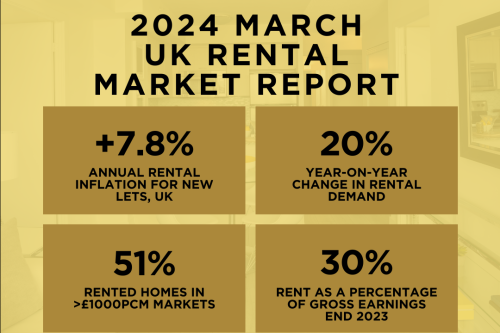- Free Valuation
- Competitive Sales Commission Fees
- Free Mortgage Advice

posted 14th April 2024
The latest data on the UK rental market indicates a significant deceleration in rental inflation, marking the lowest rate in two years. Rental inflation has dropped to 7.8% from 11% a year ago, attributing to weakening demand and mounting affordability pressures. Despite this moderation, rental prices continue to climb, with the average UK rent now standing at £1,223 per month.
Factors Influencing Rental Inflation
The moderation in rental inflation primarily stems from a decline in demand coupled with growing affordability constraints, rather than a substantial increase in supply. Notably, levels of new investment by private landlords remain subdued, contributing to the prevailing imbalance between supply and demand. Currently, the average letting agent manages 12 homes for rent, reflecting a 20% increase compared to last year but still 28% below the pre-pandemic average.
Demand Dynamics
Demand for rented homes has decreased by a fifth over the past year, influenced by the receding impact of pandemic-related factors, a cooling labor market, and lower mortgage rates that have supported first-time buyers. However, despite this decline, there are still over 15 inquiries for every available rental property, indicating a persistent demand-supply gap.
Shift in Rental Brackets
The rental landscape has undergone significant changes, with the pandemic years driving a notable increase in rental prices. Since January 2020, rents have surged by 29%, pushing a larger proportion of rented homes into higher rental brackets. Presently, over half (51%) of rented homes are situated in markets with average rents exceeding £1,000 per month, nearly double the level observed five years ago.
Emergence of New Rental Markets
The growth in higher rental bracket areas is extending beyond the south of England, as new city center rental markets emerge in regional markets. This expansion is attributed to the development of over 90,000 new 'build to rent' homes across the UK in recent years, with corporate and institutional investments playing a significant role.
Rental Affordability
Rental affordability has reached a concerning level, with rents for new lets outpacing average earnings for over two years. This trend has resulted in rental affordability accounting for 29.5% of gross earnings by the end of 2023, posing challenges for tenants, particularly first-time buyers.
Future Projections
Looking ahead, projections suggest a further slowdown in rental inflation to around 5% over 2024, accompanied by a consensus among economic forecasters that average earnings growth will dip below 4%. However, there is little immediate prospect for rental affordability to improve, given the persistent supply-demand imbalance.
Recommendations
To address the affordability crisis in the rental market, there is a pressing need for a sustained expansion in available supply. While more supply is expected from the new build sector, significant improvements in affordability hinge on increased investment by private landlords. However, current trends indicate that such investments are unlikely to materialize, as landlords continue to navigate higher mortgage rates and growing regulatory challenges, further exacerbating the supply-demand imbalance.
In conclusion, boosting rental supply remains the most viable solution to improve affordability in the UK rental market, although achieving this goal will require concerted efforts from stakeholders across the industry.






